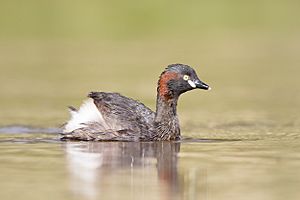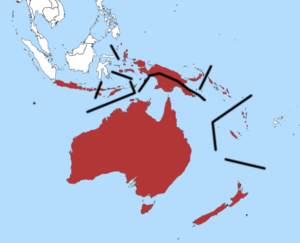Australasian grebe facts for kids
Quick facts for kids Australasian grebe |
|
|---|---|
 |
|
| A mature Australasian grebe in its breeding plumage | |
| Conservation status | |
| Scientific classification |
|
| Kingdom: | Animalia |
| Phylum: | Chordata |
| Class: | Aves |
| Order: | Podicipediformes |
| Family: | Podicipedidae |
| Genus: | Tachybaptus |
| Species: |
T. novaehollandiae
|
| Binomial name | |
| Tachybaptus novaehollandiae Stephens, 1826
|
|
 |
|
| Distribution of the Australasian grebe with subspecies separated with lines | |
| Script error: The function "autoWithCaption" does not exist. | |
Script error: No such module "Check for conflicting parameters".
The Australasian grebe (Tachybaptus novaehollandiae) is a small waterbird. You can often find it on freshwater lakes and rivers. It lives in Australia, New Zealand, and some nearby Pacific islands. This bird is about 25 to 27 centimeters (10 to 11 inches) long. It's one of the smallest birds in the grebe family.
Contents
About the Australasian Grebe
Grebes are a group of diving waterbirds. The Australasian grebe is known for its excellent swimming and diving skills. It's a common sight in its home regions.
Different Types of Australasian Grebes
Just like people can have different features depending on where they live, animals can too. Scientists call these different groups subspecies. The Australasian grebe has several subspecies found in different places:
- One type lives in Java.
- Others are found in the Talaud and Sangihe Islands.
- Another group lives in northern New Guinea.
- The most common type is found in southern New Guinea, Australia, Tasmania, and New Zealand.
- There are also types in Vanuatu and New Caledonia.
- And one specific type lives on Rennell Island in the Solomon Islands.
What They Look Like
Australasian grebes change their look depending on the season. This is called their plumage (their feathers).
Breeding Feathers
When it's time to breed, both male and female grebes look very striking. Their backs are dark brown. Their heads and necks are shiny black. They have a bright chestnut-colored stripe on their face. This stripe goes from behind their eye to the bottom of their neck. Their eyes are yellow, and they have a clear pale yellow spot on their face, just below the eye.
Regular Feathers
When they are not breeding, both sexes look a bit duller. The chestnut stripe disappears. The face spot becomes whiter. Their throat and chest turn a grey-white color. They might look similar to another type of grebe, the hoary-headed grebe, when they are not breeding.
How They Behave
The Australasian grebe is an amazing swimmer and diver. If it feels scared or in danger, it will quickly dive underwater. It then swims away, usually resurfacing 10 to 15 meters (33 to 49 feet) away. This helps them escape from predators (animals that hunt them).
They are not very strong flyers. They usually only fly long distances at night. This is probably to avoid predators. If they have enough food and a safe place to live, they tend to stay close to home.
Raising Their Young
Both parent grebes help raise their chicks. When the chicks are very young, they often ride on their parents' backs. They hide safely between the parents' slightly raised wings.
The male grebe usually leaves after a couple of months, when the chicks are about three-quarters grown. The chicks start to dive and find their own food when they are about 10 weeks old. At this point, the mother might also leave. However, mothers have been known to come back later to check on their chicks.
Grebe parents are very protective of their young. They will try to scare away other water birds, like ducks or herons, if they come too close. They do this by confronting them, flapping their wings wildly, or splashing water at them.
Images for kids
See also
 In Spanish: Zampullín australiano para niños
In Spanish: Zampullín australiano para niños
 | Ernest Everett Just |
 | Mary Jackson |
 | Emmett Chappelle |
 | Marie Maynard Daly |







